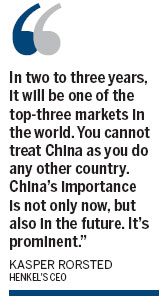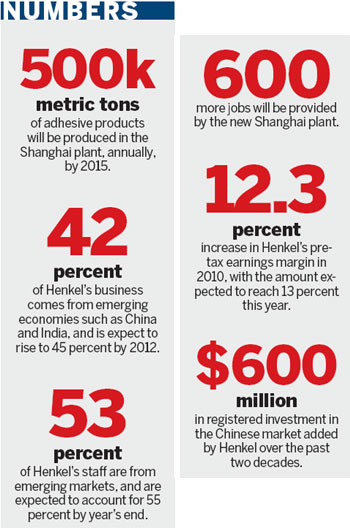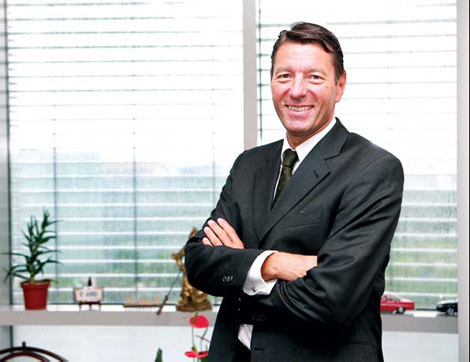China-Europe
Chemistry Special: Henkel's tailor-made approach to China
Updated: 2011-08-23 08:01
By Ma Zhenhuan and Wang Ying (China Daily)
|
Henkel's CEO Kasper Rorsted. |
Germany's Henkel, a world leader in consumer goods and adhesives, now plans to secure its leading position in every single market around the world, a company executive has said.
To support this, Henkel AG & Co, which has a number of world-famous consumer goods and industrial products, just had a ground-breaking ceremony for the world's largest adhesive plant, in Shanghai, on August 19.
It was built at a cost of 50 million euros ($71.62 million) and is located in the Shanghai Chemical Industry Park, and will be Henkel's 15th manufacturing plant in China.
 |
Adhesives account for approximately 50 percent of Henkel's global business, and in Asia, for around 80 percent.
Kasper Rorsted, Henkel's CEO, explained to China Daily in an exclusive interview, "It's the largest part of our businesses, and is growing the fastest, and is the most profitable. We're the global leader today - two-and-a-half times bigger than No 2."
The first phase of the plant project will be completed in the next 12 to 15 months, and the last phase, by 2015, by which time the plant will be able to produce around 500,000 metric tons of adhesive products a year.
Rorsted went on to say that the new plant will mainly serve the China market, with 90 percent of the capacity expected to be consumed here, simply because of the growing demand for its products.
In addition to adhesives, Henkel specializes in laundry and home care products and cosmetics and toiletries. Leading brands include Schwarzkopf, Loctite, Teroson, Pritt and Pattex.
Emerging economies
Currently, 42 percent of Henkel's business comes from emerging economies such as China and India. The company has said that it expects that figure to rise to 45 percent, by 2012.
"We're very confident we'll hit that 45-percent target because of the many investment projects we have in emerging markets. The China plant is one example of how we've moved our infrastructure to emerging markets," Rorsted said.
In fact, at the moment, 53 percent of Henkel's staff members come from emerging markets and, by the end of the year, it expects that number to grow to 55 percent, showing that it is "a truly global company," as Rorsted put it.
Still, of all the emerging markets, China is by far the most important in Henkel's eyes.
"In two to three years, it will be one of the top-three markets in the world. You cannot treat China as you do any other country. China's importance is not only now, but also in the future. It's prominent," he went on to explain.
China is the company's fifth largest market, and it hopes to make China one of its top two, by 2015.
To show how important it is to Henkel, Rorsted cited the following, "The head of our global adhesives business, the company's biggest division, has been residing in Shanghai for six years."
He said that Henkel will continue to invest in China and create more jobs here, noting that the Shanghai adhesive plant alone will bring 600 jobs. In addition, the company will continue to expand its R&D facilities, and develop new products in and for Asia.
After reporting its best performance ever, in 2010, Henkel kept up the momentum in the second quarter of 2011, lifting profits by 8 percent, to 514 million euros.
Part of that came from the economic revival worldwide in 2010, which sparked Henkel's growth: it had a year-on-year sales increase of 11.2 percent, totaling 15.09 billion euros. Of that, the Asia-Pacific region contributed 14 percent, and almost 40 percent of the Asia-Pacific region's revenues came from China.
That same year, the company saw a robust performance, with the pre-tax earnings (EBIT) margin hitting 12.3 percent. This year, the company's margin goal is 13 percent.
The secret to maintaining that high performance, according to Rorsted, is having the right people, and Henkel's management team has spent a great amount of time on making sure that it attracts, retains, and develops the right people.
Talent strategy
To do that, Henkel has its own specific development plans for hiring the most suitable, talented people for its China division.
Rostad said he had a good example of the company's global talent development plan, an incident from last Tuesday, in a talk he had with a Chinese-American about her China experience. Her parents were from China, she was born in America, she had worked in Germany, and now she's been working in China for three months.
Henkel has clearly defined training programs for all its employees, which start immediately after students graduate from university.
"We give them different basic training, sales training, marketing training, and supply-chain training, then strategy training, for the best people in the world. For example, we send them to Harvard business school," Rorsted said.
In doing this, Henkel works with a number of business schools.
In addition, it has started a Henkel Academy, which has its own, tailor-made curriculum to be certain that employees are well prepared for different job types.
"We want to make them better people, because the better they are, the better we are," Rorsted concluded.
Henkel established a representative office in Beijing back in 1988, then, two years later, founded its first joint venture here.
Its strategic investment and business development have continued over the past two decades and it now has more than $600 million in registered investment in the China market. The Henkel Asia-Pacific and China HQ has been in Shanghai's Zhangjiang high-tech zone, since June 2007.

E-paper

Pearl paradise
Dreams of a 'crazy' man turned out to be a real pearler for city
Literary beacon
Venice of china
Up to the mark
Specials

Power of profit
Western companies can learn from management practices of firms in emerging economies

Foreign-friendly skies
About a year ago, 48-year-old Roy Weinberg gave up his job with US Airways, moved to Shanghai and became a captain for China's Spring Airlines.

Plows, tough guys and real men
在这个时代,怎样才"够男人"? On the character "Man"

